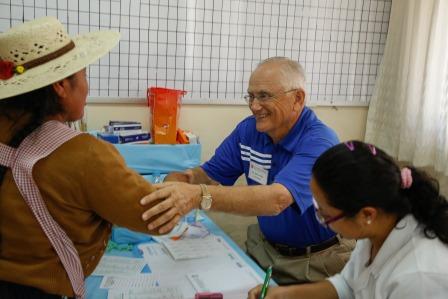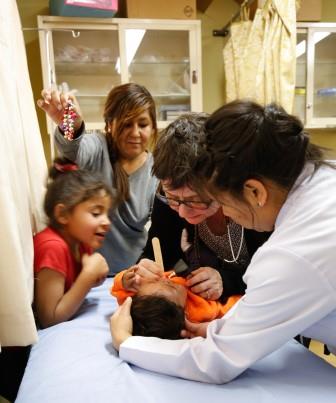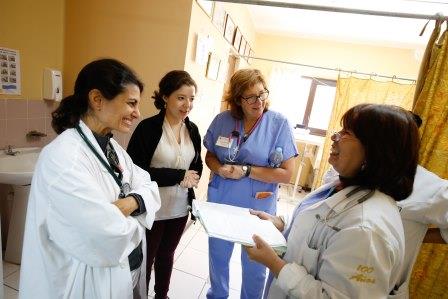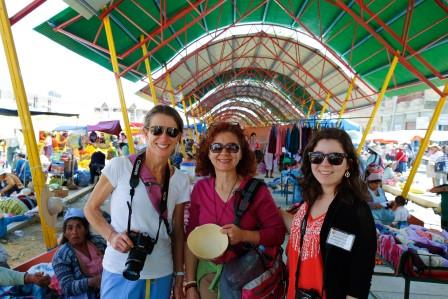Called and Sent: Reflections from the Journey
Written by Rachel Gunderson
As an organization rich in faith, we refer to those who travel with us as missioners. Yesterday, I had the opportunity to reflect with Fr. Bob Oldershaw (10-time missioner and trip Chaplain) on what it means to be a missioner. To be a missioner is to be called; called out of our comfort zones, away from our homes and away from the world as we think we know it; called to use our gifts and talents in the service of the world’s needs. Missioners experience this call in many different ways. To be on mission also means to be sent; sent to bring blessing, healing, hope, and encouragement to our sisters and brothers who live in deep poverty; sent to learn and be transformed by the relationships we build. We do not come to help or to fix. We are sent to serve and be served. Today in our blog, we share a few reflections from our team in the midst of their mission experience.
Dr. Mary Hall, Pediatrician, first-time missioner: “I met a mother in clinic today, and in talking with her I learned that she spoke three languages: Quechua, Spanish, and Italian. She was very dignified and proud of these skills. I was reminded that each person we meet has a profound depth, which goes deeper than the simple needs that bring them to this clinic.”
Sofi Porter-Castro, Solidarity Bridge staff member, interpreter and first-time missioner: “This week I was privileged to observe during two surgeries, a hernia repair and a gall bladder. It was my first time in the OR. During the second surgery, our Medical Director, Enrique, talked me step-by-step through the process of removing a gall bladder. When I expressed my amazement, he agreed saying, “Surgery is like fixing a plane while in flight. The challenge is not the procedure but keeping the patient alive and well.”
Dr. Bob LaPata, Gynecologist on his seventh trip: “On this trip, I saw one of the most difficult consultations I’ve ever had on a mission. A woman, who was 78 years old, came in with two of her daughters-in-law. Unfortunately, she had a very advanced form of cervical cancer that was also causing complications with her kidney function and swelling in her legs. Her prognosis was not good. I referred them to a higher level hospital in the city, but even with more resources, I doubt that she will survive her disease. Cases like these are always very difficult, but here, I was especially struck by the intense care that her daughters-in-law offered. They were incredibly tender with her, helping her in and out of her wheelchair, but also asked vigorous questions and were determined to get her whatever care she needed. They loved her as though she were their own mother.”
Dr. Enrique Via Reque, Medical Director and co-founder of Solidarity Bridge: “On this trip, I served as the Medical Director and oversaw the operating room and surgical teams. What moved me was joining in prayer, led by our general surgeon, Dr. Magued Khouzam. At the beginning and the end of each surgery he invited us to pray for the team, that they may operate well, and for the patient, that they may heal well and quickly.”
The OR team takes a moment to pray before beginning the operation.
Dr. Monica Joseph, Pediatrician and first-time missioner: “On Tuesday morning, at our lodging, the woman who prepares our meals came out of the kitchen very distressed. She asked us to pray for her nephew in the US who was undergoing surgery that morning. Fr. Bob joined us and we circled her in prayer, asking for a good outcome for her nephew, Jimmy. Though it was in a language I couldn’t understand well, it was a very moving experience for me. Later in the day, I connected with her, and she put me on the phone with her relative in the US who confirmed that the surgery had gone well.”
Susana Castro-Pollard, Interpreter, first-time missioner: “As a graphic designer, I was struck by the colors, shapes and textures all around us, especially in the hospital. It was a real contrast from how I see hospitals in the US.”
Cecilia Miranda, Interpreter on her second trip: “For me, a Bolivian American, it is very emotional to come home. I see so much need in the children here, and I think that could have been me if I had I not had the opportunity to move to the states when I was young. I am so grateful to all of the missioners for their willingness to come here, to know this country and to share their talents.”
Carla Andrea Cossio Ledo, Bolivian med school graduate serving as an interpreter on her first trip: "During the initiation ritual on the first night, I began to feel that there was a purpose for my being here; that God had chosen this time in my life to speak to me. When people would ask me what I wanted to do with my life, I was never quite sure how to answer. During this week, I have learned so much; both academically and spiritually. I have learned something from every doctor that I've talked to, and now I feel different. I think I can now answer the question 'what do you want to do with your life?' I want to be a doctor like those who have inspired me here this week, and I want to be a missioner for life."
“At its heart, the journey of each life,
is a pilgrimage,
through unforeseen sacred places
that enlarge and enrich the soul.”







